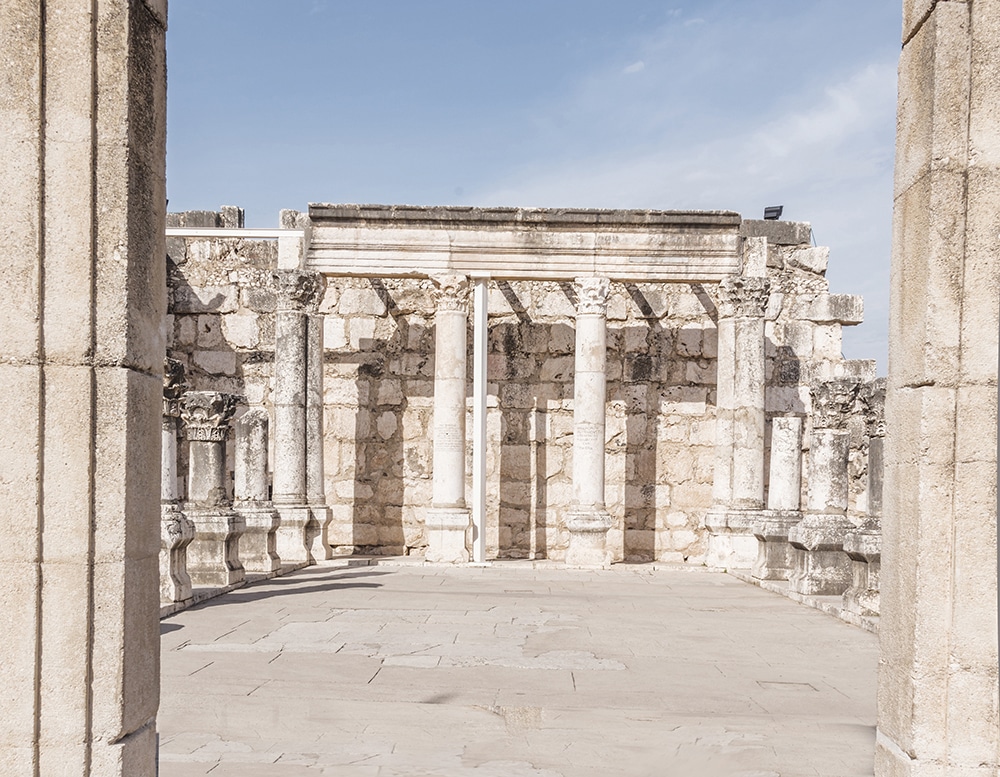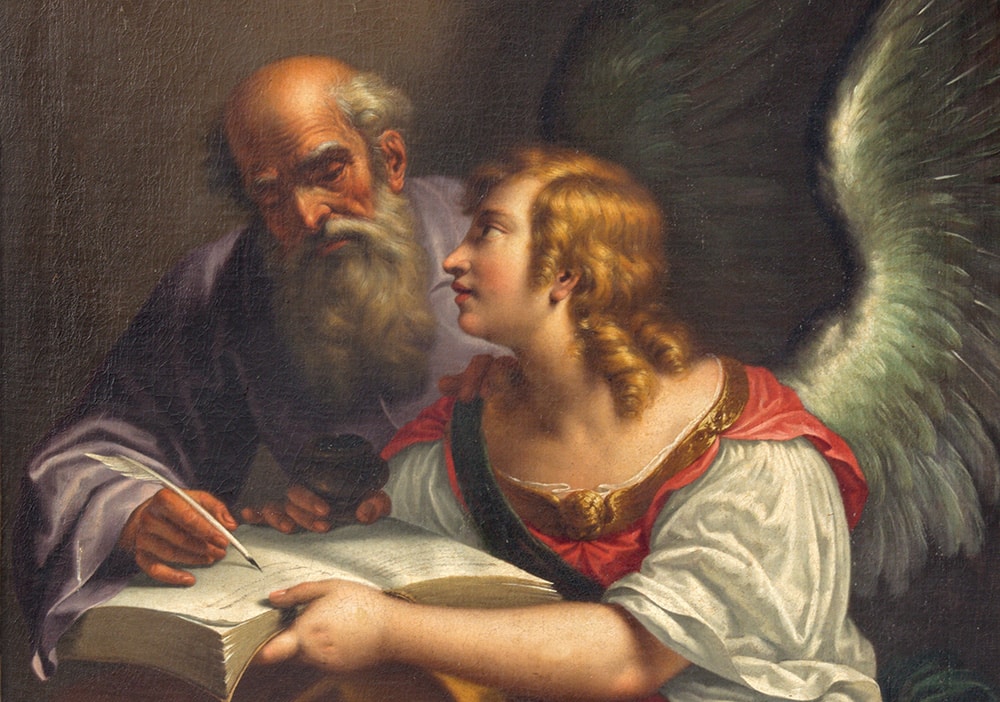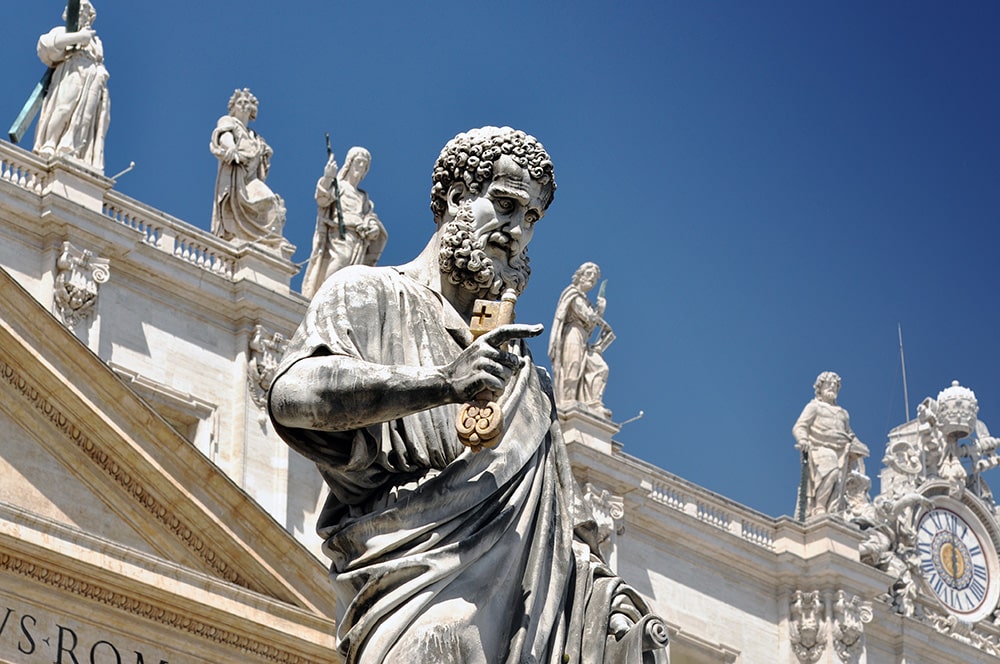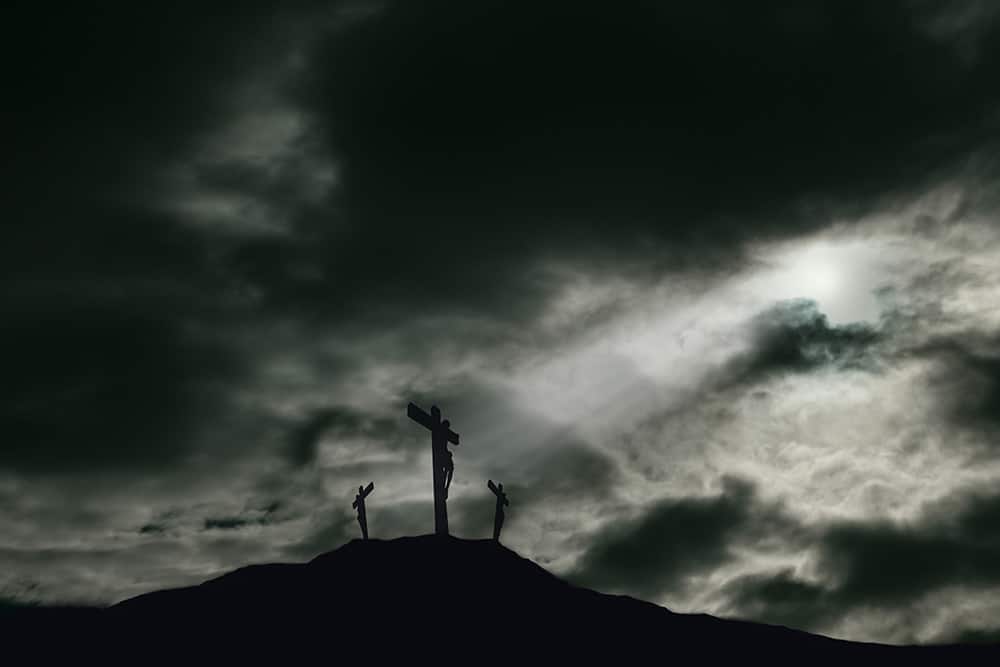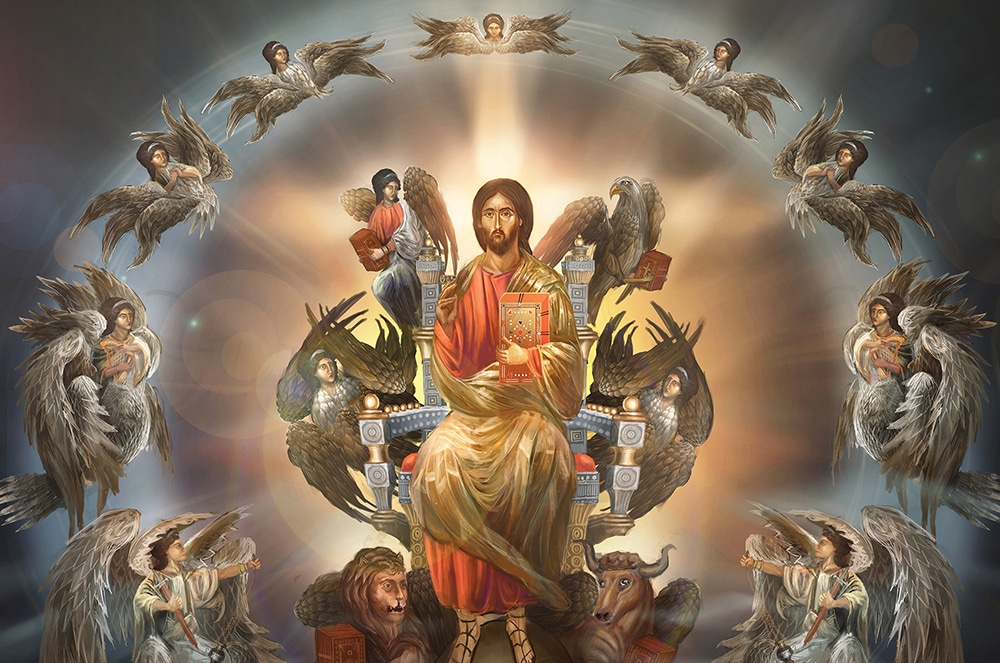This is the sixth in a 12-part series of In Focuses dedicated to exploring some central themes and texts in the Gospel of Matthew.
In Matthew 12, Jesus says that “something greater that the temple is here” (v. 6). He says the same of himself with respect to Jonah and Solomon (v. 41, 42). With these words, Jesus reveals something of his own identity, and it is enough to elicit the ire of the Pharisees. Soon after the first of these claims, they “went out and took counsel against him to put him to death” (v. 14). What, though, is the claim contained in these words? What does it mean for Jesus to say that he is “greater” than all of these?
| QUESTIONS TO CONSIDER |
|---|
|
Holiness of the Sabbath
The first of these claims — that “something greater than the temple is here” — comes amid a pair of disputes about Sabbath observance. If we compare the way Jesus handles each dispute, we will catch something of his boldness. Let’s begin with the latter of these, when Jesus meets a man with a withered hand in the synagogue and the Pharisees, wishing to accuse Jesus, ask him whether it is “lawful to cure on the sabbath” (Mt 12:10).
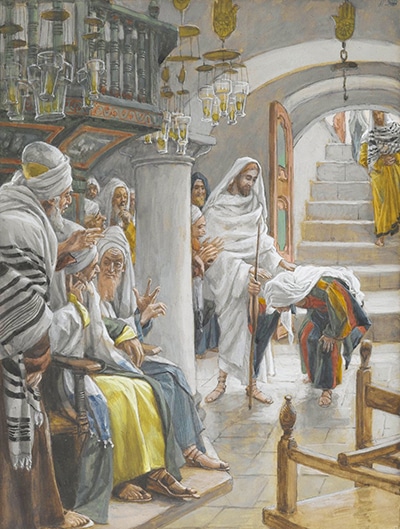
Such a question, which might strike some as trivial, reaches to the heart of Judaism. The Sabbath, we should remember, commemorated God’s rest on the seventh day (cf. Gn 2:2; Ex 20:11) as well as the “rest” given to Israel in their being freed from Egypt (cf. Dt 5:15). It was on a day on which no servile work could be done (cf. Ex 20:9-10), a day on which Israel was called to worship (cf. Ex 34:21). We might summarize by saying that it was the day on which Israel was made free to be fully alive — to be released from servitude and to do the one thing for which the human family was made, namely, to worship the Lord. Seen in this way, the profanation of the Sabbath entailed much more than the breaking, in this instance, of a few rules about what constituted reaping. To profane the Sabbath was to reject the great gift of one’s very identity and so also the gift-giver from whom it came. It was, in however limited a way, to reject Israel’s vocation as “a kingdom of priests, a holy nation” (Ex 19:6).
In his reply to the question about whether it was lawful to cure on that day, Jesus acknowledges the holiness of the Sabbath. He answers not by saying, “Oh, never mind with all those rules!” but by stipulating what the Law does in fact allow. He says, “it is lawful to do good on the sabbath” (Mt 12:12).
His reasoning for this answer builds on the Pharisees’ own position. We have evidence of a debate in that generation about whether, on the Sabbath, one could lift an animal that had fallen into a pit. The Essenes — a movement within Judaism alongside the Pharisees, Sadducees and others — held that no such rescue was possible: “If (a beast) falls into a cistern or into a pit, let it not be lifted out on the sabbath” (Damascus Document 11:13-14). The Pharisees and the later rabbinic tradition disagreed. Jesus appeals to that very judgment and argues that if good can be done to an animal, a fortiori, it can be done to a man: “Which one of you who has a sheep that falls into a pit on the sabbath will not take hold of it and lift it out? How much more valuable a person is than a sheep” (Mt 12:11-12).
We should notice that none of this discussion depends in the least on the identity of Jesus. The same argument might have been made by Peter or John or of his disciples. It could have been made by the Pharisees themselves. It is not owing to some special prerogative of Jesus that he is free to do good on the Sabbath. It is rather, something which the Law seems to allow. In Jesus’ other dispute with the Pharisees, it is quite another story. The issue there is not one of jurisprudence but of Jesus’ identity as Lord.
Lord of the Sabbath
“At that time Jesus was going through a field of grain on the sabbath. His disciples were hungry and began to pick the heads of grain and eat them” (Mt 12:1). Seeing this, the Pharisees accuse the disciples of acting unlawfully. In reply Jesus recalls the example of David. When he and his men were hungry, they entered “the house of God and ate the bread of offering,” something which the Law only permitted the priests to consume (Mt 12:4, cf. 1 Sm 21:1-6; Lv 24:5-9). Jesus’ point is not that such prohibitions were meaningless in the time of David, but that they are subordinate to the needs of the king. Claiming the same exemption for himself and his men, Jesus identifies with the Son of David. Like his ancestor, the needs of Jesus and his disciples are superior to the “needs” of the Sabbath. This, though, is only half of the story. (And by itself, the argument is only half successful, for it is not clear that the actions of David took place on the Sabbath.)
Jesus continues by asking, “have you not read in the law that on the sabbath the priests serving in the temple violate the sabbath and are innocent?” (Mt 12:5). That is to say, the Law itself requires the priests to perform activity on the Sabbath — activity that can be classified as work (cf. Lv 24:8; Nm 28:9-10). And yet, such work is not truly a defilement. Why is this the case? Simply put, the command to cease from all work was not an end in itself. It was, as we said earlier, meant to free Israel from servile work, free her to do the one thing for which the human family was made, namely, to worship the Lord. If, then, the business of worship itself involved some “work,” so be it. It would make no sense to shut down worship on account of respect for Sabbath when the Sabbath itself was ordered to worship.
Again, though, the reasoning seems weak. Jesus, after all, is not standing in the temple. His disciples are not performing priestly service. The argument seems to make no sense — none, that is, until we are told that “something greater than the temple is here” (Mt 12:6). Jesus himself is the presence of God in Israel, and so to abide with Jesus is akin to engaging in temple service. Just as the priests are free to do all that is involved in being present to God in the temple, so the disciples are free in the presence of Jesus. “[T]he Son of Man is Lord of the sabbath” (Mt 12:8) because the Sabbath exists for nothing else than to bring Israel into his presence. He is not simply the Son of David, the new king of Israel. Jesus is her eternal king, whose glory the temple would contain but who is himself “greater than the temple.”
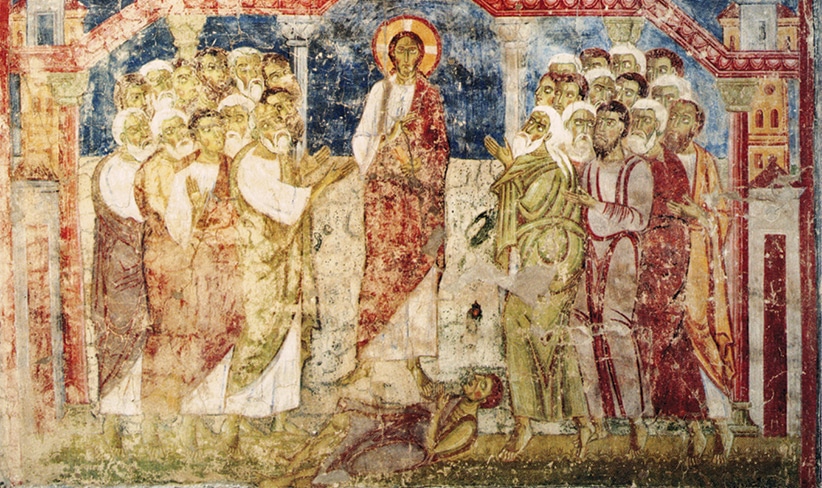
The wisdom of God
The same assertion underlies the other two sayings in this chapter. To see what Jesus means in claiming that he is “greater than Jonah” (Mt 12:41) and “greater than Solomon” (Mt 12:42), we should recall his words a little earlier in the Gospel. At the end of chapter 11, Jesus says “Come to me, all you who labor and are burdened, and I will give you rest. Take my yoke upon you and learn from me, for I am meek and humble of heart; and you will find rest for yourselves. For my yoke is easy, and my burden light” (Mt 11:28-30). These words are thick with Old Testament allusions. If we connect the dots among them, a picture emerges. Jesus, the new Moses, is “meek” like his predecessor (cf. Nm 12:3). But whereas Moses is merely the conduit for the giving of the Law and is himself one to whom the Lord grants “rest,” Jesus occupies a different role. He — as we saw in the remark about the temple — is himself the lawgiver, and it is the taking up of his teaching that will “give you rest.” Rightfully, he identifies himself with divine wisdom (cf. Mt 11:19) and so the yoke of divine wisdom that we hear about in the Book of Sirach (51:26) is here spoken of by Jesus as “my yoke.” As W. D. Davies and D. C. Allison explain in their “International Critical Commentary” on Matthew, “Jewish teachers commonly spoke of the yoke of the Torah and the yoke of the commandments. But no Jewish teacher ever told another: Take up my yoke. This, however, is precisely what Jesus does. He is, therefore, playing not only the part of Wisdom, he is Torah, the full revelation of God and of God’s will.”
This stands in stark contrast to Jesus’ estimation of the Pharisees. Earlier in the Gospel, he accused them of being “false prophets, who come to you in sheep’s clothing” (Mt 7:15). They are, by his judgment, like trees that bear no good fruit (Mt 7:16-20). In our chapter, Jesus challenges the Pharisees to be otherwise. “Either [make] the tree good and its fruit good, or [make] the tree rotten and its fruit rotten” (Mt 12:33). How so? By taking upon themselves Jesus’ teaching, his yoke. In reply to this challenge, the Pharisees ask for proof that Jesus is who he claims to be. Are you really, they ask, one who can speak of giving us rest, of laying upon us not the yoke of Torah, but your yoke?
| 3 KEY LESSONS |
|---|
|
In reply, our Lord invites the comparison of himself with the prophet Jonah: “An evil and unfaithful generation seeks a sign, but no sign will be given it except the sign of Jonah the prophet” (Mt 12:39). For Matthew, this carries two meanings. First, the resurrection of Jesus will demonstrate that he belongs not to Beelzebul (as the Pharisees claim in Mt 12:24) but to the Father. “Just as Jonah was in the belly of the whale three days and three nights, so will the Son of Man be in the heart of the earth three days and three nights” (Mt 12:40). And this proof of his identity will prove also the truthfulness of his teaching. “The sign of Jonah,” writes Dan Harrington, “is that pagans repent at the preaching of a Jewish prophet.” While Jesus is not received by his fellow Jews, he will be welcomed in by the nations — by “Nineveh” as it were. And so, “At the judgment, the men of Nineveh will arise with this generation and condemn it, because they repented at the preaching of Jonah; and there is something greater than Jonah here” (Mt 12:41). By this sign — the resurrection of Jesus and his acceptance among the nations — the Pharisees will know that he is who he claims to be, “the power of God and the wisdom of God” (1 Cor 1:24).
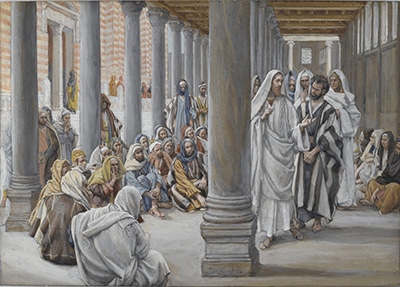
The point is immediately driven home by the last of the “greater than” sayings. It was to Solomon, the pinnacle of wisdom in ancient Israel, that even one as distant as the Queen of Sheba came. So also now, when God’s wisdom is himself present in Israel, the nations will come to do him homage (cf. Mt 2:1-12). But those who are already in his midst will reject him. And so just as the “men of Nineveh” will condemn “this generation” because they did heed the one who is greater than Jonah, so to “At the judgment the queen of the south will arise with this generation and condemn it, because she came from the ends of the earth to hear the wisdom of Solomon; and there is something greater than Solomon here” (Mt 12:42).
In claiming that he is greater than the temple, greater than Jonah and greater than Solomon, Jesus gives us a mosaic of Old Testament references. Fitting them together, we see in these words Jesus’ claim to be the presence of God in Israel, the one who conveys — indeed, who is — divine wisdom, and so the yoke of whose teaching is what allows one to enter into God’s rest. It is a scandalous claim — so much so that some “went out and took counsel against him to put him to death” (Mt 12:14). But for those who receive it, it is the source of entry into God’s rest, entry into Christ, who as Augustine says “is the true Sabbath.” Let us, therefore, strive to enter into that rest (Heb 4:11).
Anthony Pagliarini is an assistant teaching professor and director of undergraduate studies in the Department of Theology at the University of Notre Dame.
| COMING NEXT MONTH |
|---|
|
What is a parable, and why does Jesus so often use this method of teaching? Are they used to conceal or to speak plainly? In the next installment, we will answer these questions as we read three well-known parables in Matthew — namely, the parable of the two sons (21:28-32), the parable of the wicked tenants (21:33-46), and the parable of the wedding banquet (22:1-14).
|

